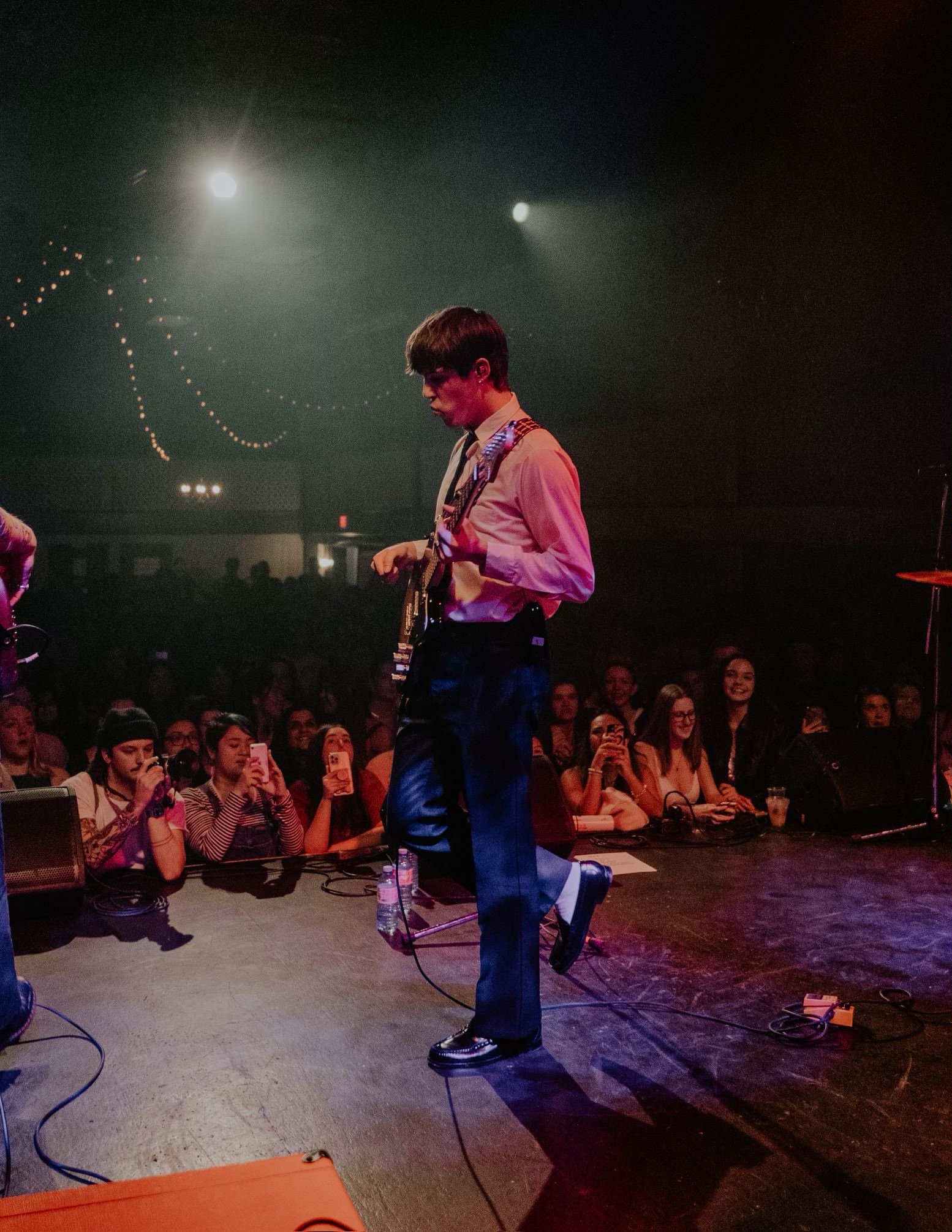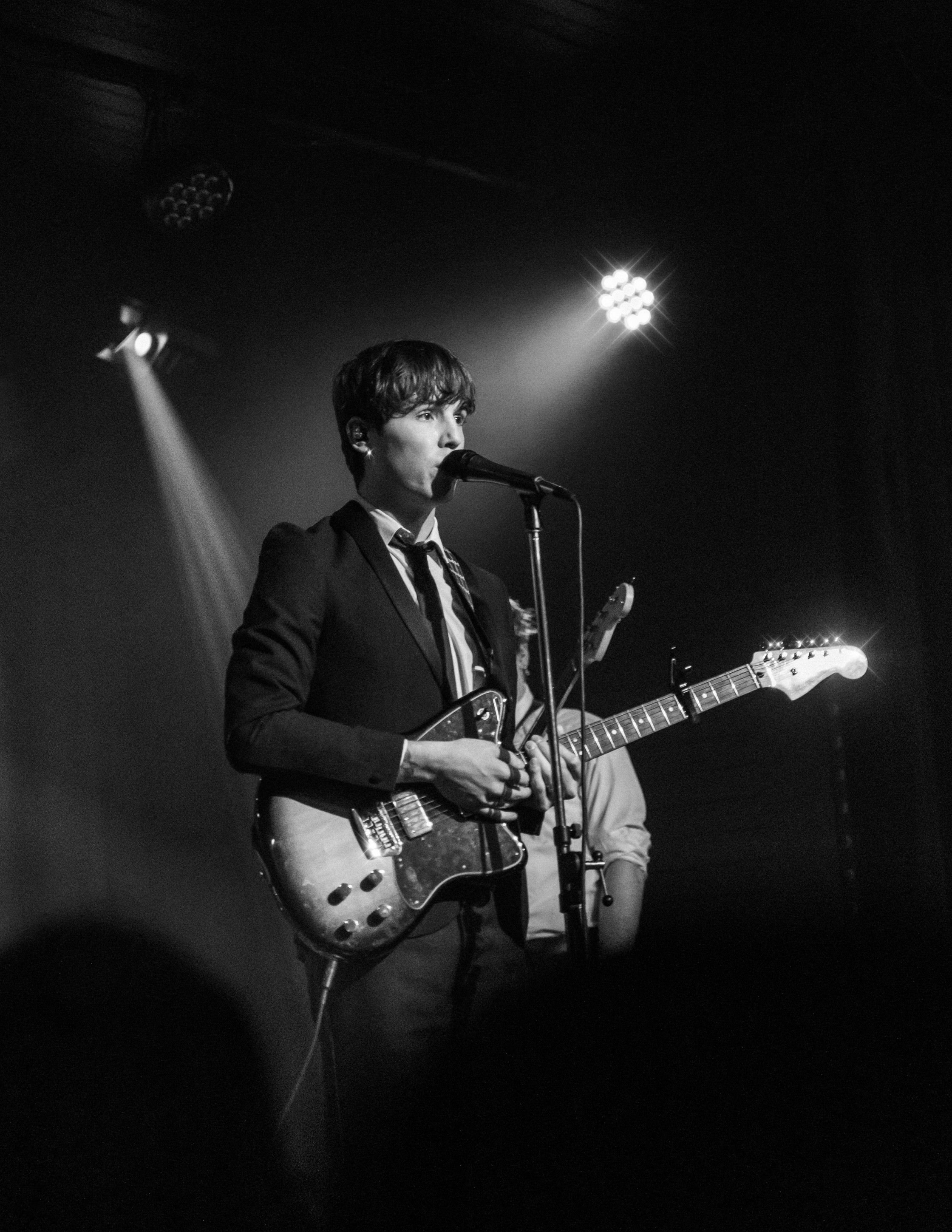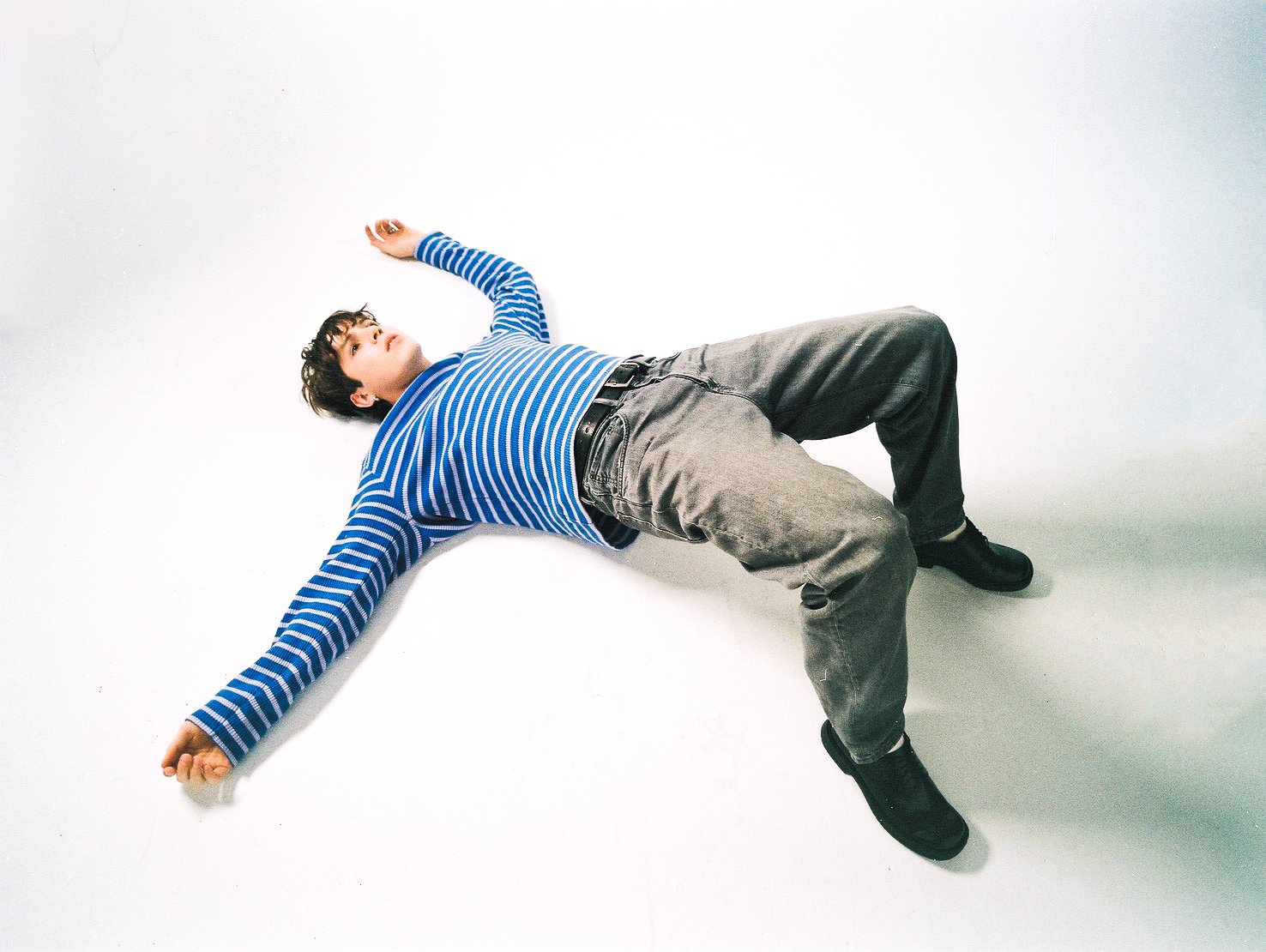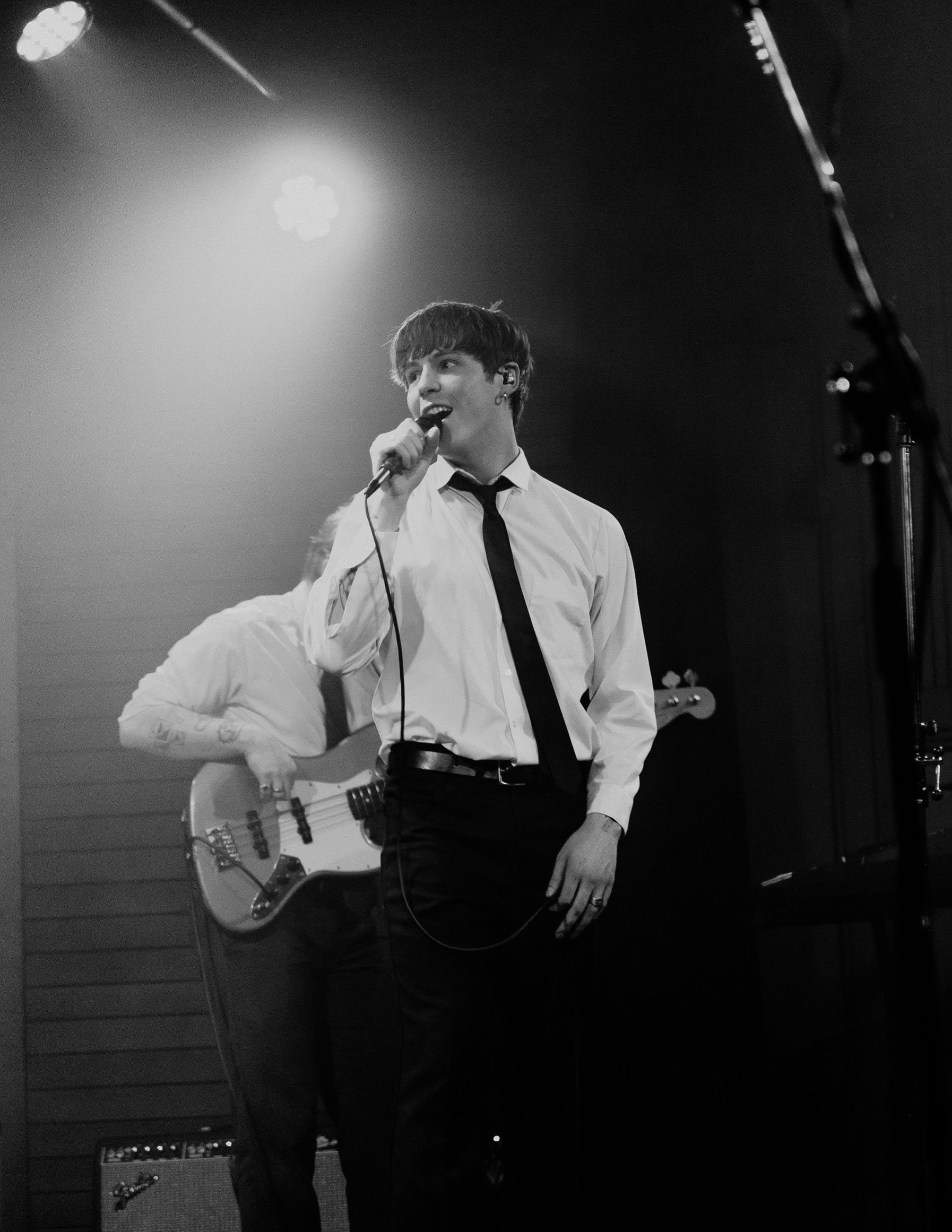Interview: young friend Shares A Vulnerable Version of Himself on New “Scaredy Cat EP”
Interview by Greg Poblete | Photos provided by Nettwerk Music Group
Photo by Zachary Vague
March 3, 2023 — Drew Tarves, known by the musical moniker, young friend, dives head first into Gen-Z angst, digital dystopia, and existential crisis with his new Scaredy Cat EP. Hailing from Vancouver, British Columbia, Tarves brings a blend of theatrical indie tunes and soft pop bangers itching to burst through the bedroom walls for the masses to hear.
Riding off the success of the ambitious debut record in 2022, HOW DID WE GET HERE?, Scaredy Cat EP improves upon all fronts including instrumentation, songwriting, and narrative focus introducing a new, more vulnerable side of Tarves fans have yet to see. The grand finale of the EP, “feral canadian scaredy cat,” demonstrates that Tarves is reaching for the sky, displaying his introspective fears draped in blaring guitars and thumping drums, encouraging all within earshot to sing along.
With a handful of releases already under the young friend name, Tarves is continuing his upward trajectory with energetic live performances and dazzling music videos to accompany such an eclectic discography. We had the honor to talk with Tarves about the latest EP, the role the Internet has played in his musical career, and what he hopes the future looks like for young friend.
Greg: First off, how are you and where are you currently in the world?
Drew: I’m doing really well. I’m back in Vancouver, BC. I just got back yesterday. I was in New York for six days, and then I was in Toronto for five days.
Greg: Sweet. Being from Vancouver, how do you feel like your geographical roots inspire your art? And what did your musical upbringing look like in Canada?
Drew: Yeah, as far as musical upbringing, I didn’t really have a musical upbringing as far as playing instruments goes. I didn’t start playing any instruments or even think about writing music until I was sixteen, seventeen, but I was just always a really avid listener and fan. Growing up, my dad was always playing music around the house, and I always knew that I loved it, but I didn’t know that I loved making it until I was a bit older.
But as far as Vancouver goes, for my art, I’m really connected to nature, and nature is kind of the biggest part of Vancouver. It’s such a focus point of the city. So I feel like sometimes I do write about being in nature, but I actually don’t feel like where I am necessarily has the biggest effect on my music. I think it’s more who I’m with that has the biggest effect, or who I’m around.
Photo by Kiri Anne
Greg: Do you feel like if people ever do find out that you’re a musician from Canada, do you ever feel like you’re being put into a box?
Drew: Constantly, yeah. I feel like that only really happens with other Canadians, though. I feel like most of the Americans that I meet, when they find out I’m Canadian, they’re like, “Oh, that’s cool.” But I feel like generally, Americans’ understanding of Canada as a place can be quite narrow. People always ask me if it’s really cold where I’m from, and I grew up here, just north of LA. It gets cold, but it doesn’t get that cold. I think there’s a certain idea that people have about Canadian musicians, but I find that that’s typically coming from other Canadian musicians.
Greg: That makes sense. I mean, at the end of the day, musicians just make music, and I feel like that’s a universal language.
Drew: It’s just art, right?
Greg: Exactly. Well, I wanted to talk about the new EP, which is amazing, by the way. What have you learned about yourself as an artist working on the Scaredy Cat EP and what do you feel like this body of work brings to the world of music?
Drew: Yeah, it’s so funny. I feel like it really came together in the blink of an eye. I’ve been working with this producer, David Marinelli, for the last two and a half years. But we hadn’t ever met in person, and I don’t even think we talked on the phone until the end of May, beginning of June of 2022 when I finally went up to go work with him in person. And we wrote the whole thing in five days. I had two songs written, and I had demos of those two songs, but the other three we wrote while we were there. The two that I brought were “little pieces” and “white noise,” and then the other ones just came together. We did a song a day. I think the first day, we did “little pieces,” I want to say, and then the rest just kind of all fell into place.
But it’s really special music to me. I feel like it’s a side of myself that I’ve yet to show to at least the people that listen to my music. I feel like up until this point, they’ve gotten, for the most part, a pretty poppy, alternative view, or that’s what they’ve been getting from me. But I feel like this dives a bit more into the kind of music that really has influenced me for most of my life.
Photo by Kiri Anne
Greg: The EP ends with this very grand instrumentation as you repeatedly sing, “I’m just a feral Canadian scaredy cat.” What scares you the most about making art, and how do you get over this fear?
Drew: I’m still figuring out how to get over it. I think for me, what helps me get over it is putting it out there and just kind of dropping the curtain and letting everybody in all at once. But I also feel like that’s simultaneously the scariest part, because pretty much everything I say in all the music is stuff that happens to me and things that have happened, or are currently happening while I’m writing it, and it can be scary. I think that does help to just put it out. To just take my hands off of the wheel and say, this is yours now. I don’t know if I will ever not be afraid of vulnerable parts of myself to the world. Maybe I’ll get better at managing the fear.
young friend - feral canadian scaredy cat (Official Music Video)
https://www.youtube.com/watch?v=w35IV9n83dg
Greg: Yeah, or maybe it’s feeling that you’ll get more used to over time.
Drew: Maybe.
Greg: There’s one track that really resonated with me, “17.” What is the significance of the age seventeen for you?
Drew: That song is super important to me. It’s so funny, my mom hadn’t heard it and she called me the day the EP came out and she was laughing, “You didn’t tell me this whole song was about me.” That was really funny. When I was seventeen, I graduated high school and went to university in Edmonton, Alberta. I went there and I was just really starting to get into writing music and learning some production, and still learning how to write songs and figure out what that looked and sounded like for myself. But I got to university and within a week of being there, I was like, “I can’t do this anymore. I’m going to go crazy if I stay here.” Because the whole time that I was there, all I wanted to do was stay in my dorm room and write music. Seventeen was a really pivotal age for me because shortly after I figured out that I didn’t want to stay in school. I dropped out and moved back to Vancouver and started pursuing music and learning, and working more at it. If I hadn’t made some of the decisions I made when I was seventeen, I’d probably be in a really different position in my life.
Greg: It seems like narrative-wise, your songs come from a very personal place and internal conflict. How do you feel like songwriting helps you expand your emotional capacity?
Drew: Without being cliché, I feel like songwriting is a form of therapy. And by sitting down and saying, “I’m going to write a song about this particular subject.” It kind of forces me to look at sides of the situation that I haven’t been able to see before. And it just helps me learn more about what I’m going through. I feel like some of the songs, especially some of the songs on “Scaredy Cat,” I feel like if I wouldn’t have written those songs, I probably wouldn’t have gotten through that situation the way that I did. I feel like different aspects of my life would be different right now without some of those songs. But that’s such a cliché thing to say that “writing music is like therapy.” I still think that therapy is really important. Real therapy. But this helps me understand the things and the people, and myself a lot better.
Greg: I feel like songwriting is definitely a way for your internal self to tell you what you’re thinking even before you know what you’re actually feeling. That’s a really cool thing.
Drew: It’s like you have the tools there to figure it out, but by writing the song, you have to actually step back and look at it and say, “Okay. How do I explain this so people understand it? And not just understand it in my own head.”
Photo by Zachary Vague
Greg: One thing I’m interested in hearing you talk about is what does the role of the Internet play in your music? How do you see your music progress as the online world and the real world continue to mesh?
Drew: Now, more than ever, the Internet is everything. It’s how we keep in touch with people and I wouldn’t have a career if it weren’t for the Internet. There’s pros and cons to the role that the Internet plays. Yeah, I wouldn’t have people listening to my music, or not as many people if it weren’t for the Internet. With that comes a lot of comparing and valuing yourself and your art based on how many people have seen it and how many people like it. I’m trying to get away from that as much as possible.
I think this is related, but recently I’ve been trying as much as possible to get the music out of the computer. Because when I started writing music and when I started producing, it all started on the computer. I would start four chords or two chords and put them on the computer, and then build this instrumental on the computer. Then I would write lyrics to the songs once I had a bit of an instrumental. But I’m trying to change that now and just write songs in person and on paper as much as possible. And just have it be… because I feel like the music I love the most is the music that feels really human. And I feel like by taking the music out of the computer, I’m tapping into more of that human-quality than I am working in the computer. And I don’t know if that has anything to do with the Internet, but I think in a way it does. Like removing the technology, or the digital aspect from the music is really valuable to me. I’m learning a lot from it.
Greg: I almost feel like there’s a warm feeling when it comes to music that’s organically and made without all the digital interfaces and stuff.
Drew: And digital music is an incredible thing. I feel like there’s a lot of digital music with these electronic aspects that I really enjoy. I think that’s not what I want to be making. So I’m just trying to switch up the process.
Greg: I respect it. As a newer artist, there’s always that initial hook that reels people into your music. If it’s one thing that you feel like drastically defines who “young friend” is as an artist, what would that be?
Drew: I feel like one of the reasons why people connect to it or to the music is because it’s honest. And I don’t feel like I’m trying to feed a story to anybody that is either not true or I’m not trying to tell anybody how to feel. I’m just talking about how I feel. I know something that I really value in artists, and art in general is honesty. If I feel like an artist is doing it because it’s the only thing that they know how to do, I’m going to gravitate more towards it. I feel like we don’t give listeners enough credit. They can tell when someone is being disingenuous, even if they don’t know it. I think it’s real to me. And I believe what I’m saying. For those that do listen, I think they can recognize that.
Photo by Kiri Anne
Greg: What do you hope the future looks like for “young friend”? Who would you like to work with? What would your ideal live performance look like?
Drew: I think about this constantly. This is a question that I never really know how to answer as far as what I want the future to look like. As far as people I want to work with, there’s a lot of really, really cool artists that I love. I’m a huge Dijon fan, I love Phoebe Bridgers like the rest of the world. I see you’ve got Toro Y Moi in the back, that’s a big one on my list for sure. I’d love to work with him. I’d love to work with Adrianne Lenker or any of the Big Thief folks for that matter. People in that sort of indie folk, alternative world, I really gravitate towards. That’s mostly what I listen to. I’d love to do that.
As far as performances go, I just played a show in Vancouver almost two weeks ago and we had the full band. There’s this group of guys that I play with that are unreal, they’re so good, and they know the music so well. And they know me so well. They’re all really close friends of mine. And I’d like the performances to look and sound like that. I want them to be full of energy and loud, and huge. I want to be able to share how we feel even when we’re just in the rehearsal room with the audience. I feel like it’s such a special thing to be able to play music that feels really good with people that you love.
But the future of “young friend,” I don’t know, I think I’m just going to keep putting out music. I’d like to make music with people that I really love and make music that feels like me, and feels really good. Yeah, I’ve got simple demands. I want to keep doing it and want to keep working with new people, and trying new things, and learning more. That’s what I want the future to look like.
To keep up with all news young friend, follow him on Instagram @youngfriend. And don’t forget to check out the new Scaredy Cat EP, streaming now on all music platforms.
about young friend:
With songs that sound like the last few coveted days of summer, 22-year-old Drew Tarves’ hopeful and honest perspective on the highs and lows of youth are embedded in his lyrics.
A trained dancer for most of his adolescence, the Vancouver native switched artistic disciplines after spending time jamming with his musician friends. “I found out very quickly that I loved it,” he recalls. “It was my favorite thing to do.” Armed with a guitar and a laptop, Tarves started hashing out early songwriting attempts on Garage Band as he found his own style that suited him: “It was all about experimenting while trying to find what worked for me.”
After releasing the buzz-building and rap-leaning mixtape yours kindly, in 2019, Tarves continued to refine his sound—drawing from the intimate indie rock of inspirations like Bon Iver, Phoebe Bridgers, and Andy Shauf—amassing millions of streams with a series of singles released over the last two years.





